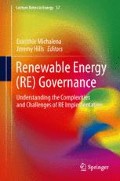Abstract
Community owned renewable energy initiatives are the emergent and self-organized arrangements where communities become both producers and suppliers of energy. Cases of community energy developments form Texel (Netherlands), and Undy and Urgha (UK) are the empirical grounds that demonstrate this capacity. As highly desirable community owned renewable initiatives may seem, they face many enablers. However, they are also confronted with various tensions, as identified in this chapter. A closer look of the governance space in which these community initiatives operate, reveals that tensions and opportunities span from socio-cultural, political, and technological axes. These initiatives are both outliers and frontrunners of a sustainable energy transition: they create new forms of institutions, challenge even benefiting to them instruments, dare to uptake risks and seize opportunities, and operate outside demarcated institutional space. Community owned energy initiatives constitute a new form of local renewable energy governance that deserves to be explored.
Access this chapter
Tax calculation will be finalised at checkout
Purchases are for personal use only
Notes
- 1.
Historical story is taken from Texelse Courant, 7th of August 2007 + interviews.
References
Allen J, William RS, Rocio Diaz-Chaveza (2012) Community-based renewable energy in the Lake District National Park—local drivers, enablers, barriers and solutions, local environment. Int J Justice Sustain, 17(3) DOI:10.1080/13549839.2012.665855
Birch K, Whittam G (2008) The third sector and the regional development of social capital. Reg Stud 42(3):437–450
Chitnis M, Sorrel S, Druckman A, Firth SK, and Jackson T (2013) Turning lights into flights: estimating direct and indirect rebound effects for UK households, Energy Policy, 55, 234–250
Corscadden K, Wile A, Yiridoe E (2012) Social license and consultation criteria for community wind projects. Renew Energy 44:392–397
Cowell R, Bristow G, Munday M (2011) Acceptance, acceptability and environmental justice: the role of community benefits in wind energy development. J Environ Plann Manage 54(4):539–557
Darby S (2006) Social learning and public policy: lessons from an energy-conscious village. Energy Policy 34:2929–2940
Egyedi T, Mehos D (eds) (2012) Inverse infrastructures. Disrupting networks from below. Edward Elgar, Cheltenham
Grin J (2010) Understanding transitions from a governance perspective, Part III in Grin J, Rotmans J, Schot J (eds) Transitions to sustainable development, New directions in the Study of long term transformative change, pp. 223–236, Routledge, USA
Gross C (2007) Community perspectives of wind energy in Australia: the application of a justice and community fairness framework to increase social acceptance. Energy Policy 35:2727–2736
Hoffman SM, High-Pippert A (2010) From private lives to collective action: recruitment and participation incentives for a community energy program. Energy Policy 38(12):7567–7574
Loorbach D, Frantzeskaki N (2012) Why taking complexity seriously implies a paradigm shift for policy studies, Chapter 15, In: Lasse Gerrits and Peter Marks (ed) COMPACT I: public administration in complexity, pp 327–345, Emergent Publications, USA
Moulaert F, Ailenei O (2005) Social economy, third sector and solidarity, relations: a conceptual synthesis from history to present. Urban Stud 42(11):2037–2053
Mumford J, Gray D (2010) Consumer engagement in alternative energy—can the regulators and suppliers be trusted? Energy Policy 38:2664–2671
Musall FD, Kuik O (2011) Local acceptance of renewable energy—a case study from southeast Germany. Energy Policy 39:3252–3260
Nikogosian V, Veith T (2012) The impact of ownership on price-setting in retail-energy markets—the German case. Energy Policy 41:161–172
Pestoff VA (1992) Third sector and co-operative Services—an alternative to privatization. J Consum Policy 15:21–45
Rygg BJ (2012) Wind power—an assault on local landscapes or an opportunity for modernization? Energy Policy 48:167–175
Saunders RW, Gross RJK, Wade J (2012) Can premium tariffs for micro-generation and small scale renewable heat help the fuel poor, and if so, how? Case studies of innovative finance for community energy schemes in the UK. Energy Policy 42:78–88
Scott-Cato M, Hillier J (2010) How could we study climate-related social innovation? Applying Deleuzean philosophy to transition towns. Environ Politics 19(6):869–887
Seyfang G, Haxeltine A (2012) Growing grassroots innovations: exploring the role of community-based initiatives in governing sustainable energy transitions. Environ Plann C Gov Policy 30:381–400
Seyfang J, Smith A (2007) Grassroots innovations for sustainable development: towards a new research and policy agenda. Environ Politics 16(4):584–603
Smith A, Raven R (2012) What is protective space? Reconsidering niches in transitions to sustainability. Res Policy 41:1025–1036
Stirling A (2008) “Opening up” and “closing down”: power, participation, and pluralism in the social appraisal of technology. Sci Technol Hum Values 33(2):262–294
Verbong G, Loorbach D (eds) (2012) Governing the energy transition, reality, illusion or necessity?. Routledge, USA
Voss JP, Bornemann B (2011) The politics of reflexive governance: challenges for designing adaptive management and transition management. Ecol Soc 16(2):9 (www.ecologyandsociety.org/vol16/iss2/art9)
Voss JP, Smith A, Grin J (2009) Designing long-term policy: rethinking transition management. Policy Sci 42:275–302
Walker G, Devine-Wright P, Hunter S, High H, Evans B (2010) Trust and community: exploring the meanings, contexts and dynamics of community renewable energy. Energy Policy 38:2655–2663
Wesselink A, Paavola J, Fritsch O, Renn O (2011) Rationales for public participation in environmental policy and governance: practitioners’ perspectives. Environ Plann A 43:2688–2704
Wolsink M (2012) Undesired reinforcement of harmful ‘self-evident truths’ concerning the implementation of wind power. Energy Policy 48:83–87
Acknowledgments
This research has been funded by the ARVODI research contract with the Dutch Ministry of Infrastructures entitled “Governance of sustainable infrastructures” and by the Research Programme Next-Generation Infrastructures.
Author information
Authors and Affiliations
Corresponding author
Editor information
Editors and Affiliations
Rights and permissions
Copyright information
© 2013 Springer-Verlag London
About this chapter
Cite this chapter
Frantzeskaki, N., Avelino, F., Loorbach, D. (2013). Outliers or Frontrunners? Exploring the (Self-) Governance of Community- Owned Sustainable Energy in Scotland and the Netherlands. In: Michalena, E., Hills, J. (eds) Renewable Energy Governance. Lecture Notes in Energy, vol 23. Springer, London. https://doi.org/10.1007/978-1-4471-5595-9_6
Download citation
DOI: https://doi.org/10.1007/978-1-4471-5595-9_6
Published:
Publisher Name: Springer, London
Print ISBN: 978-1-4471-5594-2
Online ISBN: 978-1-4471-5595-9
eBook Packages: EnergyEnergy (R0)

